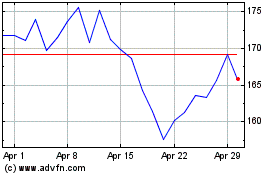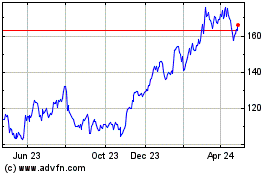Dead Calm Before the 5G Storm -- Heard on the Street
August 01 2019 - 2:51PM
Dow Jones News
By Dan Gallagher
The global smartphone market is taking a significant pause ahead
of the rollout of 5G services. The big question is just how long
that pause will last.
Market research firm IDC reported Wednesday that global
smartphone sales fell 2.3% year over year during the June quarter.
That is the seventh straight quarter of declines for the industry.
IDC's data showed iPhone unit sales falling 18% to 33.8 million,
which would be the lowest number of quarterly sales that Apple's
iconic smartphone line has seen in six years. Apple no longer
reports unit sales itself, but the company said in its fiscal
third-quarter report Tuesday that iPhone revenue for the same
period slid 12% year over year to about $26 billion.
Qualcomm painted an even bleaker picture on Wednesday. Fiscal
third-quarter revenue came in a bit below Wall Street's estimates,
though adjusted per-share earnings exceeded expectations. But the
company's forecast was a different story, with Qualcomm essentially
projecting a significantly weaker business for the next two
quarters as device makers and wireless carriers clean out inventory
ahead of a big 5G push next year.
Qualcomm is also hurt by its continued royalty dispute with
Huawei and the fact that the Chinese smartphone giant uses its own
chips for devices sold in that country. This means that 5G can't
appear on the scene soon enough for Qualcomm, Apple and others in
the smartphone business.
Wireless carriers are indeed pushing hard to upgrade their
networks to the next-generation technology. AT&T said on its
earnings call last week that it expects to have "nationwide 5G
coverage" by the middle of next year. Verizon said on its own call
Thursday morning that it expects to have 5G service up and running
in 30 markets by the end of this year. China also aims to have
national 5G networks in place next year,
Billed as the next generation of wireless networks, 5G promises
blazing speeds and a vastly increased data capacity needed to
underpin future technologies, such as autonomous cars.
But early reviews of 5G services have been rough, noting the
service's spotty availability and the tendency of the phones to
overheat. And those phones are expensive: the 5G version of
Samsung's latest Galaxy S10 lineup costs about 30% more than an
equivalent model without 5G. Wireless customers are already
resistant to handset prices that have been creeping well over the
$1,000 mark, and it is unclear whether faster service in limited
markets will be enough to convince them to absorb further price
increases.
And while Apple hasn't announced its plans, the company isn't
expected to introduce a 5G iPhone until late next year. That too
will likely be a significant constraint on 5G demand given the fact
that the iPhone has leading market share at the premium end of the
smartphone market where customers are more likely to upgrade early.
As fast as 5G service promises to be, the wait will be painful.
Write to Dan Gallagher at dan.gallagher@wsj.com
(END) Dow Jones Newswires
August 01, 2019 14:36 ET (18:36 GMT)
Copyright (c) 2019 Dow Jones & Company, Inc.
QUALCOMM (NASDAQ:QCOM)
Historical Stock Chart
From Mar 2024 to Apr 2024

QUALCOMM (NASDAQ:QCOM)
Historical Stock Chart
From Apr 2023 to Apr 2024
